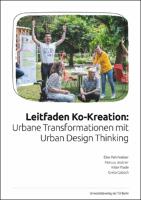Leitfaden Ko-Kreation: Urbane Transformationen mit Urban Design Thinking
| dc.contributor.author | Pahl-Weber, Elke | |
| dc.contributor.author | Jeutner, Marcus | |
| dc.contributor.author | Flade, Kilian | |
| dc.contributor.author | Gabsch, Greta | |
| dc.date.accessioned | 2022-04-15T13:09:00Z | |
| dc.date.available | 2022-04-15T13:09:00Z | |
| dc.date.issued | 2022 | |
| dc.identifier | ONIX_20220415_9783798332492_6 | |
| dc.identifier | OCN: 1348375628 | |
| dc.identifier.uri | https://library.oapen.org/handle/20.500.12657/54065 | |
| dc.language | German | |
| dc.subject.classification | thema EDItEUR::R Earth Sciences, Geography, Environment, Planning::RP Regional and area planning::RPC Urban and municipal planning and policy | en_US |
| dc.subject.other | co-production | |
| dc.subject.other | co-creation | |
| dc.subject.other | urban development | |
| dc.subject.other | city development | |
| dc.subject.other | participation | |
| dc.title | Leitfaden Ko-Kreation: Urbane Transformationen mit Urban Design Thinking | |
| dc.type | book | |
| oapen.abstract.otherlanguage | “Urban co-creation“ is en vogue. But how can it be achieved in planning practice? It requires methods that take the complexity of cities and their development into account and that, at the same time, have a low threshold for everyone to participate. The Urban Design Thinking (UDT) method is capable to include the needs of users in the development of their city within the framework of co-creative urban development and thus enables the generation of ideas for complex urban challenges. It was developed in 2015 by the Chair of Urban Renewal and Sustainable Development at the Technical University of Berlin, based on Stanford University’s Design Thinking method. UDT has already been applied in a variety of study and research projects, including the research project „Migrants4Cities“, which TU Berlin carried out together with the City of Mannheim and inter3 – Insitut für Ressourcenmanagement. This guide provides a practical overview of the application of UDT based on the project experiences of „Migrants4Cities“. It places the method in the context of co-creation in urban development. The necessary framework for a successful UDT process as well as the potential challenges are presented. Insights into UDT practice are provided by an overview of the ideas developed in the project „Migrants4Cities“ as well as an interactive UDT quick run-through, which, invites readers to try it out for themselves. | |
| oapen.identifier.doi | 10.14279/depositonce-12852 | |
| oapen.relation.isPublishedBy | e5e3d993-eb32-46aa-8ee9-b5f168659224 | |
| oapen.relation.isFundedBy | 5cb0e793-9d8a-4b83-9ee6-25b062467484 | |
| oapen.relation.isbn | 9783798332492 | |
| oapen.collection | AG Universitätsverlage | |
| oapen.pages | 63 | |
| oapen.place.publication | Berlin | |
| oapen.grant.number | 01UR1905A-C | |
| oapen.grant.project | Migrants4Cities – Umsetzung, Verstetigung, Transfer |

